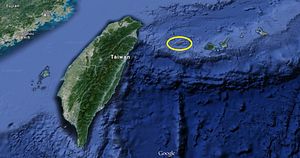In a move that threatens to reverse the recent signs of a burgeoning thaw in China-Japan relations, Japan will break ground Saturday on a new military lookout station on Yonaguni, Japan’s westernmost inhabited island. Yonaguni, which has a population of around 1,500, is located 108 kilometers east of Taiwan and 150 kilometers south of the disputed Senkaku/Diaoyu Islands. According to Reuters, with the new outpost, Yonaguni’s military presence will expand from two police officers to 100 soldiers and a radar outpost.
A report in the Ryukyu Shimpo said that the base will be built on 25 hectares of land leased from Yonaguni to the Ministry of Defense. In return, the local government will receive around 15 million yen ($150,000) in rent each year. Construction will begin with the groundbreaking ceremony on Saturday, and is expected to be completed by the end of fiscal year 2015.
Japanese Defense Minister Itsunori Onodera said in a press conference Tuesday that Japan “decided to deploy a GSDF (Ground Self-Defense Force) unit on Yonaguni Island as a part of our effort to strengthen the surveillance over the southwestern region.” The new outpost will house radar equipment. As a result, it is expected to increase Japan’s surveillance capabilities both over the disputed islands and the areas close to the Chinese mainland.
The addition of 100 Japanese troops to an island so close to the disputed islands obviously has the potential to exacerbate the already substantial tensions between China and Japan. When asked about Yonaguni Island during a regular press conference, Foreign Ministry spokesperson Hua Chunying said, “Due to historical reasons, any of Japan’s military moves will raise concern among Asian countries.” She added, “Japan should give a serious explanation for its real intention of building military muscle in [the] relevant region.” For China, the stationing of troops onYonaguni is one more piece of evidence of Japan’s rising militarism. It could also provide China with ammunition to fire back at recent accusations from Shinzo Abe that China seeks to unilaterally change the status quo in the region.
Meanwhile, the residents of Yonaguni are divided over the militarization of their island. Some are optimistic that the new outpost will help boost a flagging local economy. In addition, those worried about Chinese aggression believe the GSDF unit will help keep them safe. Others, however, fear that their island could become ground zero in a hypothetical conflict between Japan and China. They suggest that economic cooperation with Taiwan is the key to jump-starting Yonaguni’s economy.
Japan has made defending its outlying islands a priority recently. However, the idea of stationing troops on Yonaguni has been under discussion since at least 2011, when then-Prime Minister Naoto Kan vowed to defend Japan’s outlying islands after an incident with a Chinese fishing boat near the Senkaku/Diaoyu Islands. Japan Times traces the debate back even farther, noting that Yonaguni’s mayor was reelected in 2009 with a promise to invite troops to the island. “The plan has been a focal point of every subsequent election on the island,” Japan Times said.
That a long-debated plan is finally coming to fruition speaks to a greater sense of political urgency on behalf of the central government. Reporters at Tuesday’s press conference with Onodera cited a protest submitted to the Okinawa Defense Bureau by Yonaguni residents, asking for the project to be canceled. Onodera said he had not heard about the protest, but said “I am aware that various opinions exist in Okinawa including Yonaguni Island.” Still, Onodera added, “We are staunchly determined to protect Yonaguni Island, a part of the precious Japanese territory.”

































